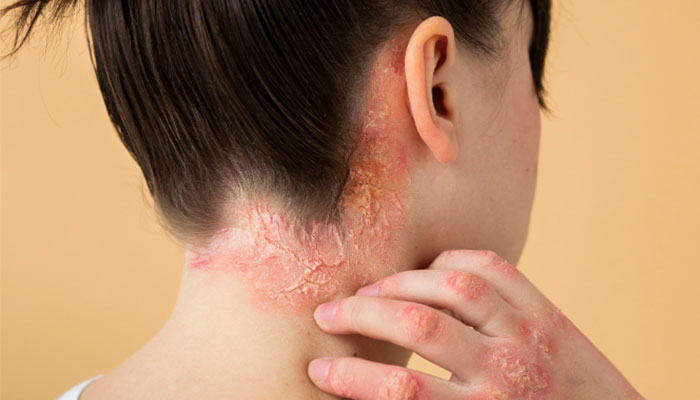Introduction
Eczema, also known as atopic dermatitis (AD), is a skin condition that causes inflammation and irritation of the skin. The term “atopic” is derived from the fact that people with atopic dermatitis are more likely to develop allergic conditions, including asthma and hay fever.
Signs and Symptoms of Eczema
- Itchy skin
- Skin rash
- Bumps on skin
- Leathery thick patches of skin
- Flaky skin
- Swelling
Causes of Eczema
- An autoimmune condition
- Genetic changes
- Environmental triggers
- Emotional triggers
Understanding Eczema in Ayurveda
In Ayurveda, eczema, referred to as “Vicharchika,” is primarily attributed to imbalances in the body’s doshas, particularly Vata and Kapha. Eczema is seen as a result of impaired digestion, leading to the accumulation of toxins (Ama) in the body. Additionally, emotional stress, improper diet, and exposure to allergens can aggravate the condition.
Treatment and Management
Eczema treatment aims to alleviate symptoms and prevent flare-ups. It involves topical corticosteroids or non-steroidal creams to reduce inflammation and itching. Moisturizers help maintain skin hydration. For severe cases, oral medications or phototherapy may be prescribed. Identifying and avoiding triggers and practising proper skincare is also crucial in eczema management.
Care offered by SGP’s PSA has been demonstrated to be effective in alleviating symptoms and enhancing the quality of life for patients with eczema. The primary focus of care delivered by the PSA is to manage symptoms, address emotional and psychological distress, and improve overall comfort.
FAQs about Eczema
-
An individual with eczema cannot transmit the disease to others, even if they experience a rash. Nevertheless, individuals with broken skin caused due to eczema are at risk of developing skin infections.
-
Yes, stress can exacerbate eczema. Emotional stress can lead to the release of certain chemicals in the body, triggering inflammation and itching, thus worsening eczema symptoms in affected individuals.
-
Eczema flare-ups can be triggered by various factors, including exposure to allergens (like dust mites or pollen), irritants (such as harsh soaps), stress, hot or cold weather, sweating, and even certain foods, all of which can exacerbate inflammation and itching.
-
Yes, individuals with eczema can swim in a pool. However, it’s essential to rinse off chlorine and moisturize immediately after swimming to reduce potential skin irritation. Using a gentle sunscreen can also help protect sensitive skin from the sun’s effects. It is also recommended to avoid swimming during an eczema flare-up as certain chemicals in the pool water may cause skin irritation.
-
While there are no universal dietary restrictions, some people find that avoiding certain foods, such as dairy or gluten, can help manage their eczema. It varies from person to person. It is recommended to consult your healthcare provider for further information.






